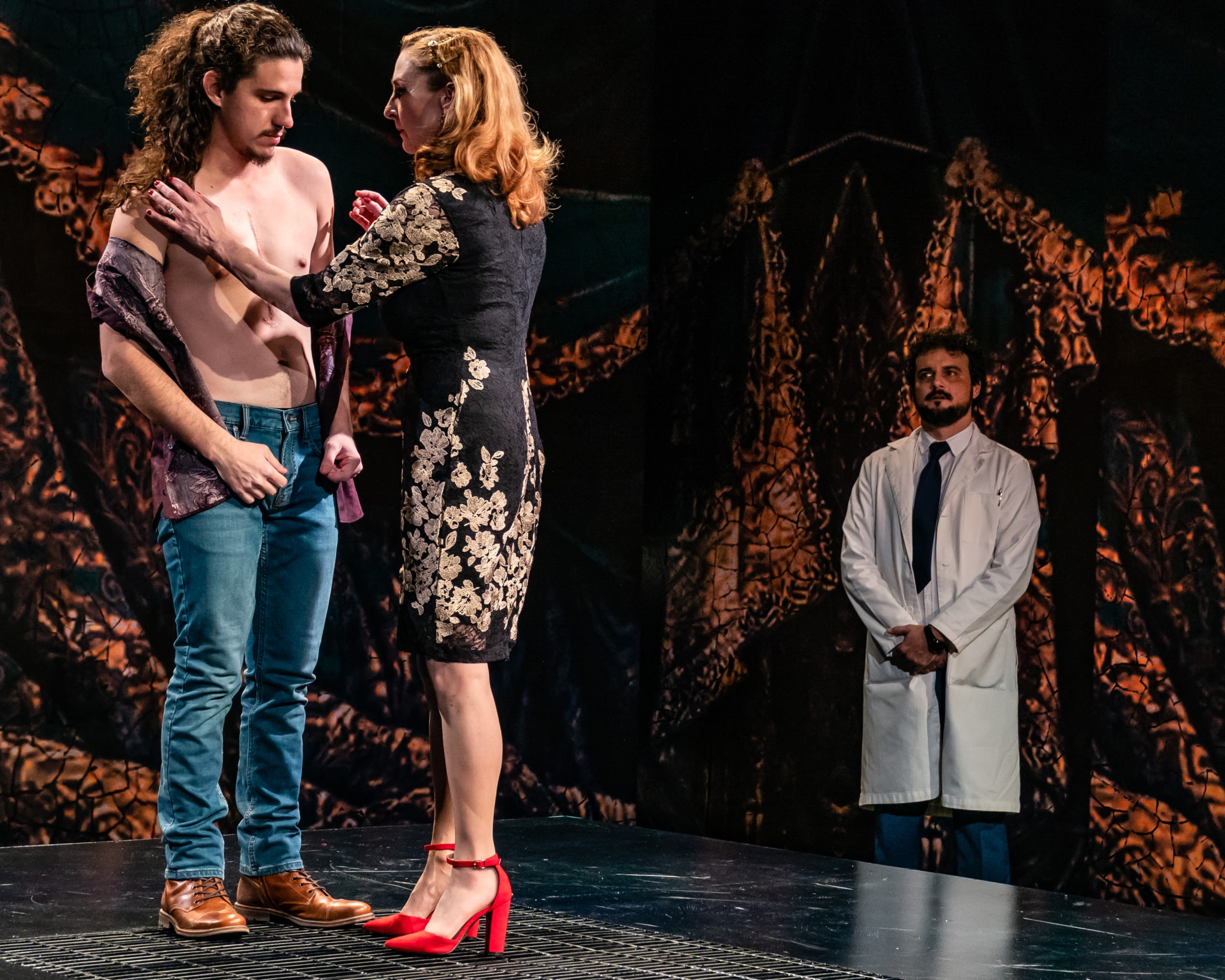In a particularly poignant scene in Pulitzer Prize-winning playwright Nilo Cruz’s Exquisite Agony, a heart transplant recipient named Amer has an intimate conversation with Romy, the pregnant daughter of the man whose heart now beats in his chest. Both grapple with the complicated feelings that come with harboring new life. And both are grateful for this moment away from Romy’s mother, whose single-minded refusal to let her dead husband go led her to track down the young man who received his heart.

It’s a rare moment of peaceful reflection in a play dominated by emotional upheaval.
“It’s so great that you pointed that out,” Cruz replies when I mention the scene. “That’s a relationship I’m very intrigued by in this production.” Although he created these characters, his attitude suggests that they have a life of their own, that he is merely observing the choices they make.

Cruz famously approaches playwrighting by developing characters first, and then letting those characters find their way into the story that he crafts around them. “I always start with a general idea for the topic, but mainly I form my plays by intertwining characters into a scenario until it becomes a play,” he explains after a recent rehearsal for GALA Hispanic Theatre’s production of Exquisite Agony. The show is now playing now through March 1, 2020 in a Spanish-language production featuring English surtitles.
In 2003, Cruz became the first Latin American to win the Pulitzer Prize with his play Anna in the Tropics. He is also a pedagogue who takes pride in sharing his craft with students at the various universities where he teaches. He currently resides in Miami where he is the artistic director of Arca Images, a theater that produces work in both English and Spanish.
The following are excerpts from our recent conversation, edited for clarity:
Let’s start by talking about Exquisite Agony itself. The play revolves around the symbolism of the heart and what it means to have someone’s heart, both literally and figuratively. How did you get the idea for this play?
I came across a story online about a man who received a heart transplant and then met with the donor’s family. I thought it was very moving and the idea stayed with me.
Millie Marcel, the character searching for her husband’s heart is an opera singer. What is the role of music in this play?
I’ve been around a lot of musicians lately so in my play, I decided to channel this experience through the character of Millie, a soprano who goes on a quest to find the recipient of her husband’s heart. Millie lives in a world of fiction, art and opera, so channeling this idea through her allowed me to explore the idea in a romantic way.
Millie wants to believe that cells have memories and contain hereditary information, that a part of her husband could still be alive inside of this young man. Can you talk about that idea?
When I started to do research, I came across a book of testimonies by heart transplant recipients who felt that their tastes had changed – taste for foods, clothes, things that they perceived to be traits of their donor. It’s a very controversial subject in medicine because there is no way you can prove this, but Millie’s belief in sensorial memory feeds her quest to find this fragment of her husband.

The Gala production is in Spanish, but I read the English script that made me wonder if you first wrote this play in Spanish or English and how you approach translating your work from one language to another?
I wrote the first act in English and then when I learned that (New York based theater company) Repertorio Español was interested in commissioning the play I started writing the second act in Spanish. Then I went back to the first act and wrote it in English. I usually write in English, but try to maintain a Latin sensibility to capture Latin rhythms with the English language. Lately, I’m doing more things in Spanish and translating my own work into Spanish.
In your experience are there a lot of theaters around the US that produce work in Spanish for audiences that speak English and Spanish?
I can think of about 10 off the top of my head across the whole country. I don’t know of a lot of theaters that are doing this. These theaters are keeping the language alive. Hearing something in its original language is just wonderful.
Let’s talk about the fact that you were the first Latin American to win the Pulitzer Prize for drama. That happened in 2003. Do you think there has been much progress in diversifying theater in the US since then?
No.
No. Very little. I think it was a cultural moment that allowed me to win. I was in New York and I was an artist in residence at the Public Theatre at that time and multiculturalism seemed to be more visible. I think it’s actually less visible now. I don’t know why that has changed but we are moving at a very slow pace.
What can be done to change that?
Audiences should demand that theaters have more variety. But more than anything, it’s the leaders of the theaters who are responsible. They are the ones that need to push boundaries and educate their audiences not to be complacent in only producing the plays that we already know. Shakespeare is wonderful, but so are writers from other cultures. For instance, I have a theater company in Miami (Arca Images) and we predominantly do plays in English and Spanish, but last year, we did two plays by French writer Jean-Luc Lagarce who is very big in Europe. Do we have a large French population in Miami? No. But that didn’t matter because we are talking about a great writer who writes about profound and interesting things. It’s the responsibility of artistic directors to expose this kind of writing to their audience.
Your development as a writer and a teacher is closely associated with several other playwrights. María Irene Fornés and Paula Vogel were mentors to you and Sarah Ruhl was your student. Seeing all those names connected is like watching a torch pass from hand to hand. What have you learned from these relationships?
I have shared knowledge with each of those playwrights. Irene was my mentor and from her, I learned to free up my imagination and dig deep in order to capture human behavior and analyze what causes us to act in certain ways. It takes time to do that. When one starts writing, we tend to write about what we know. We rely on clichés, but we need to go further than that. The best way to learn playwrighting is not through textbooks, but by creating a safe environment so you can go into the profound state of being, which is really the source of writing.
How do you apply that philosophy when working with your students?
I work with their voices and try to help them expand their voices as writers. Sometimes they don’t even have a voice at the beginning and what we do is try to help them find their voice. This takes time. I didn’t find my own voice until I was three years into the writing process.
What’s the secret for a new writer who wants to develop a voice?
Practice and discipline. Discipline is very important as a writer. And the way to create discipline is through repetition. You can’t just depend on the muse to come. You have to write every day and try to refine moments and scenes and characters. You have to detach yourself from the world and become an observer and enter the writing process. But that takes discipline.
Running Time: Two hours including one 10-minute intermission. Presented in Spanish with English surtitles.
Exquisita Agonía (Exquisite Agony) plays through March 1, 2020, at GALA Hispanic Theatre, 3333 14th St NW, Washington, DC. For tickets, call 202-234-7174 or go online.




